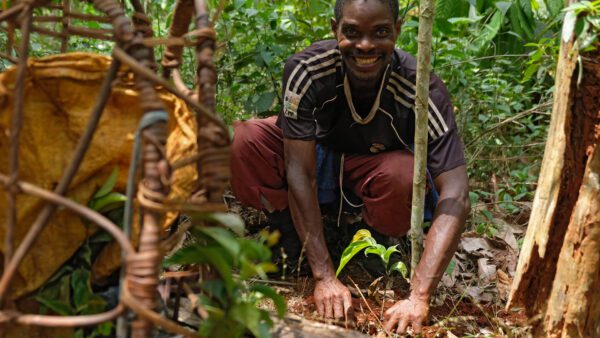
Scott Paul
Scott Paul is Taylor’s Director of Natural Resource Sustainability, a position that’s unique to the musical instrument manufacturing industry. Taylor co-founder Bob Taylor created the role with Scott in mind and hired him in 2016.
The two had first met in 2007, while Scott was working as Director of the Greenpeace Forest Campaign in Washington, D.C., on an initiative that brought Taylor, Martin, Fender and Gibson together in an effort to better understand the long-term sustainability of Sitka spruce in Southeast Alaska. (An award-winning independent documentary called Musicwood was made about the campaign, and Scott and Bob are prominently featured in it.)
Forest Policy Liaison
This was also a time noted for significant changes to international forest policy, including an amendment to the U.S. Lacey Act in 2008 (enacted to curb global trade of products made with illegally obtained tree species), along with similar legislation enacted in Australia, the European Union and Japan in the years that followed. As a result, Bob Taylor found himself spending time in Washington, D.C., where he came to learn more about Scott’s background — that years earlier, for example, Scott’s team at Greenpeace had played a central role in the 2002 listing of Big Leaf Mahogany under the Convention on International Trade in Endangered Species (CITES); that Scott had spent significant time in forests around the world; and that Scott was well connected in Washington and United Nations forest policy circles.
Bob recalls getting to know Scott on a deeper level on trips to Alaska and to Washington, D.C.
“Scott would set up meetings for us on Capitol Hill and around town,” Bob says. “He always had slightly frayed chinos, a corduroy jacket and tie that hung by his overly cluttered desk, and a razor in his top drawer just in case he needed it. I could just tell he knew what he was doing. He had been in D.C. for almost 20 years, and though we came from two different worlds, after many long conversations, we would end up agreeing on almost everything.”
A friendship based on mutual respect emerged, and the two kept in regular contact.
Landing a Gig at Taylor
In 2016 in Johannesburg, South Africa, CITES voted to list the entire Dalbergia genus, which encompasses a wide range of rosewood species, on Appendix II and created a new governing annotation that controlled its commercial trade. (The lone exception was Brazilian rosewood, which had already been listed on Appendix I to enact more stringent protections). Despite good intent, it soon become apparent that the new CITES listing had several unintended consequences, and that no other sector would be as adversely impacted as the music industry, even though musical instruments had never been cited as an issue leading up to the listing. Bob knew that the new rosewood listing was another sign that the world was changing, and that sourcing tonewoods was not going to get any easier. And he knew who to call.
Scott joined Taylor Guitars in December of 2016 with the primary focus of seeking an amendment to the CITES rosewood annotation that would preserve its intent but give relief to the musical instrument sector. For the next three years, Scott and a small ensemble of music industry interests, including representatives of instrument manufacturers, associations and touring orchestras, attended CITES meetings, met with various governments, and participated in countless conference calls. Finally, in 2019, the CITES Conference of the Parties formally revised the rosewood annotation to exempt musical instruments, parts and accessories.
Scott still attends CITES meetings regularly, but since joining Taylor, he has also played an important role in supporting, advancing and in some cases helping to lay the groundwork for Taylor’s various sustainability initiatives, from our ongoing work with ebony in Cameroon to koa in Hawaii to urban wood in Southern California.
“When the idea of urban wood bubbled up to the front of my mind,” Bob Taylor says, “I just asked Scott to look into it. I was interested in industrial-scale urban wood. He developed the pathways for us to get there. He had the skills. The time. The sense. The self-motivation. I don’t know another person like Scott who can take that slice of a project like that, something that’s never been done before, and make it easy for the rest of us to add our parts to make it work.”
Scott appreciates the unique opportunities he’s had at Taylor thus far and looks forward to continuing his work with an array of projects.
I’ve worked for some of the biggest environmental organizations in the world, and I’ve been a part of some really successful campaigns,” he reflects. “I’ve done a lot of different things in my career, but I never expected to end up at a guitar company. I’m very grateful to Bob for taking a chance and creating a position that never really existed in the industry before. I honestly believe I can do more good at Taylor moving the sustainability needle than I could at any other place I’ve worked.
Scott Paul
More From Scott Paul
-

Articles
Inside the History of Brazilian Rosewood Guitars
By Scott PaulIn celebration of Taylor’s 50th anniversary, we’ve been rolling out a diverse array of commemorative limited-edition models all year. Of all the releases, the most exclusive offering is a pair of Presentation Series guitars boasting backs and sides of venerable Brazilian rosewood.
-

Articles
The Ebony Project: Growing Into Phase 2
A decade after buying an ebony mill in Cameroon, our efforts to ensure an ethical ebony supply chain have led to new scientific discoveries and a scalable community planting program that’s on the verge of doubling in size.
-

Articles
No Finish Line
Our drive to develop better and more eco-friendly guitar finishes demonstrates that environmental stewardship will always be an ongoing effort.
-

Articles
Seeds of Change in a Changing World
In an age of climate change, growing the right tree in the right place is more important than ever. Here’s why.
Additional Articles
-

Uncategorized
Another Recognition Post
Aliquam erat volutpat. Nulla tincidunt lacus lorem, ut condimentum lacus iaculis ac. Praesent justo lacus, rhoncus in tempor eu, tempor sit amet lacus.
-

Uncategorized
Taylor Guitars Honored with the Award for Corporate Excellence from U.S. State Department
Lorem ipsum dolor sit amet, consectetur adipiscing elit. Praesent tristique porttitor magna, eget ultrices leo bibendum at. Proin suscipit placerat magna, at cursus ex egestas id. Morbi in porta sem.



























